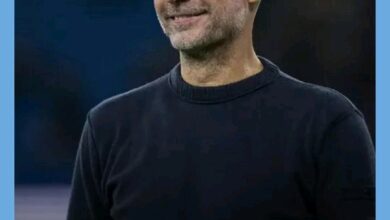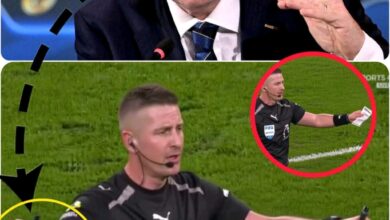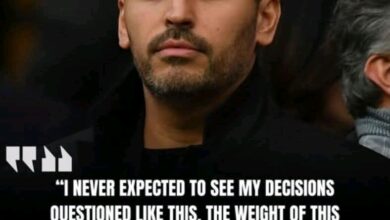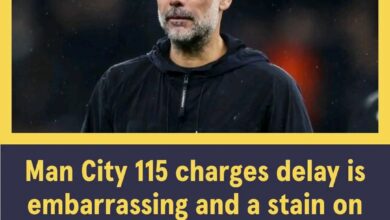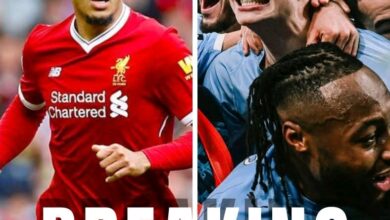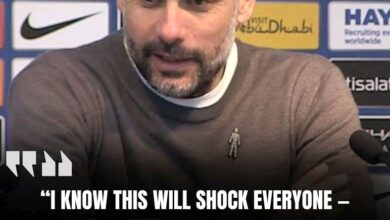Man City vs Liverpool ref watch: Three decisions Chris Kavanagh got absolutely wrong

It was supposed to be a beautiful afternoon of football, a clash between two giants of English football, a battle that could shape the direction of the Premier League title race. Manchester City and Liverpool walked out at the Etihad under a clear sky, both knowing that this game could define their season. Arsenal had dropped points against Sunderland, and the door was open for either side to close the gap. But by the end of the evening, the story wasn’t just about City’s brilliance. It was about anger, frustration, and the decisions of referee Chris Kavanagh that left Liverpool fans feeling robbed once again.
Pep Guardiola’s men were ruthless and efficient, but even their 3-0 victory came under the shadow of controversy. Arne Slot, who had arrived at Liverpool full of ambition and new ideas, stood helpless as one decision after another went against his team. For him, it wasn’t just defeat—it was injustice that burned deep.
The match began with high energy. City pressed early, controlling possession, and showing the fluid rhythm that has become Guardiola’s signature. Liverpool, on the other hand, tried to stay compact, waiting for moments to counter through Mohamed Salah and Darwin Núñez. But the first major incident came in the 17th minute when Jeremy Doku burst down the left flank with his lightning speed. Conor Bradley tried to contain him, and Giorgi Mamardashvili, Liverpool’s stand-in goalkeeper, stepped forward to block the angle. Doku fell, and for a moment, the Etihad gasped.
Chris Kavanagh waved play on. It looked like the right decision. The replay showed minimal contact—Doku had gone down far too easily. Even the City fans didn’t protest much. But moments later, VAR called Kavanagh to the screen. Slowly, the tension grew. The stadium fell into silence. After reviewing the footage, Kavanagh changed his mind. He pointed to the spot. Penalty to Manchester City.
Liverpool players protested in disbelief. Mamardashvili could be seen shouting, shaking his head, insisting he barely touched Doku. Even Arne Slot stood on the touchline with his hands raised in confusion. It was the kind of call that changes the flow of a match. Haaland stepped up, but the football gods seemed to offer Liverpool a brief moment of mercy. Mamardashvili dived perfectly and saved the penalty. The Liverpool fans roared in relief. For a few moments, it felt like justice had been served.
But City didn’t stop. They pressed, they passed, and they waited for the next chance. Haaland made no mistake the second time, scoring a brilliant glancing header to make it 1-0. The Etihad erupted. It was a beautiful goal, the kind that summed up Guardiola’s attacking style—precision, movement, timing. But deep down, Liverpool fans were already seething. They knew the penalty that led to City’s momentum was soft. It shouldn’t have been given at all.
Then came the moment that would define the night for Liverpool supporters—the disallowed goal. It was the 36th minute when Salah whipped in a corner, and Virgil van Dijk rose highest. His header was powerful, unstoppable, flying into the top corner past Donnarumma. For a few seconds, the away end exploded with noise. Van Dijk ran to the fans, fists pumping, and Liverpool believed they were back in the game.
But then came the dreaded pause. The referee put his hand to his ear. VAR check. The celebration stopped, replaced by anxiety. The replay showed Andy Robertson standing near Donnarumma. He wasn’t touching him, not blocking his sight, just there, like any player would be during a set piece. But the verdict from Stockley Park was brutal: offside interference. The goal was disallowed.
It didn’t matter that Donnarumma never had a chance of saving that header. It didn’t matter that Robertson didn’t make any contact. The decision stood. The referee announced: “Offside. No goal.”
Van Dijk couldn’t believe it. He turned to Kavanagh, arguing, pointing to the screen. Salah threw his arms in the air. Even Guardiola looked slightly surprised. Liverpool had been denied a legitimate goal. And just like that, the air was sucked out of the match for the visitors.
Football is about moments, and that moment broke Liverpool. Before halftime, City doubled their lead. Bernardo Silva found Nico Gonzalez on the edge of the box, and the Spaniard drilled the ball into the bottom corner with perfection. It was a stunning strike, one that froze Van Dijk and silenced any hope Liverpool had left. The Etihad celebrated, but for Liverpool fans, the anger only grew stronger. They weren’t just losing; they felt cheated.
As the second half began, Arne Slot tried to rally his players. He urged them to push forward, to believe. But every time they tried, City’s control suffocated them. And then, as if to add salt to the wound, Jeremy Doku scored a beautiful curling effort to make it 3-0. The Belgian’s strike was magnificent, but the mood had already turned bitter. The Liverpool fans who stayed till the end watched in disbelief, not at City’s brilliance, but at how everything had gone against them.
After the game, the anger poured onto social media. Thousands of Liverpool supporters took to X (formerly Twitter), venting their frustration. “How can Robertson be offside for standing near the keeper?” one wrote. Another said, “The Premier League needs to investigate Chris Kavanagh. That’s two major calls wrong in one game.” Some fans even suggested that VAR decisions against Liverpool had become too frequent to be coincidences. “It’s always us,” one comment read. “Every big match, every big call, it goes against Liverpool.”
Former referees and analysts didn’t help calm the situation either. Ex-PGMOL chief Keith Hackett publicly said he was baffled by VAR’s behavior during the game. “They reviewed the Doku penalty wrongly and then again interfered unnecessarily for the Van Dijk goal. Two poor interventions from VAR in one match. It’s not what technology was designed for,” Hackett said
It wasn’t just fans who were upset. Reports after the game suggested that Arne Slot was furious in private. While he remained calm in his post-match interview, sources close to the Liverpool boss claimed he felt the refereeing decisions had destroyed the rhythm of the game. “We played well for spells,” he told reporters. “But some moments changed everything. I won’t talk too much about referees, but everyone saw what happened.”
Guardiola, for his part, didn’t fan the flames. He praised his players, especially Nico Gonzalez, calling his performance “special,” but avoided discussing the refereeing. “We can only control our football,” Pep said. “The rest, we leave to the officials.” It was a diplomatic response, but even he knew that Kavanagh’s decisions had become the main talking point.
One incident from the second half added more controversy. In the 67th minute, Liverpool were on a rare counterattack through Florian Wirtz, who had come off the bench to inject energy. He sprinted through the middle, and just as he was breaking into space, Josko Gvardiol cynically brought him down. It was a clear tactical foul, the kind that always earns a yellow card. Yet Kavanagh kept his pocket closed. No card. Liverpool players surrounded him, shouting, pleading, but he waved them away. Instead, he booked Alexis Mac Allister moments later for dissent. It summed up the evening.
By the time the final whistle blew, the scoreboard read Manchester City 3, Liverpool 0. But for Liverpool supporters, the real score felt different. In their hearts, they saw two goals unfairly given away and one wrongly taken from them.
In pubs across Liverpool, the conversation that night wasn’t about tactics or finishing—it was about Chris Kavanagh. Fans replayed the moments again and again, arguing over the same questions. Was Doku really fouled? Was Robertson interfering? How could Gvardiol escape a booking? The sense of injustice grew with every replay, every comment, every headline.
For Arne Slot, the defeat was a heavy blow. His team had started the season with optimism, but inconsistency and questionable officiating had become recurring themes. The Dutch manager knew that Liverpool’s standards demanded perfection, yet even perfection couldn’t fight against the calls that had gone against them.
The media reaction was fierce. “Liverpool Robbed Again,” one fan blog screamed. “Three Decisions, One Referee, Zero Justice,” another headline read. Even neutral commentators admitted that the officiating had been poor. “Liverpool were second best, yes,” said one pundit, “but some of those decisions were indefensible.”
The Premier League later released a brief statement confirming that the referee’s call on Van Dijk’s goal was “checked and confirmed by VAR.” But that did little to calm fans who felt insulted by the explanation. To them, it wasn’t about technology—it was about fairness.
The Doku penalty incident was perhaps the clearest example of everything wrong with modern refereeing. Slow-motion replays made minimal contact look dramatic. VAR, meant to correct obvious errors, had instead created confusion and controversy. Fans began to wonder if the system was too involved, if referees were losing their instincts, or worse, their independence.
Football thrives on passion, and for Liverpool supporters, passion turns to pain when they feel betrayed. The defeat at the Etihad wasn’t just about points dropped; it was about trust lost. When supporters start to believe that decisions are tilting against them, the sport they love begins to feel rigged. And that is the deepest wound any fanbase can suffer.
Even days after the match, the debate raged on. Former players joined the discussion. Jamie Carragher called the offside decision “a disgrace to common sense.” Rio Ferdinand said the Doku penalty “should never have been given.” Gary Neville, trying to stay neutral, admitted, “Liverpool have every right to feel aggrieved.”
Meanwhile, in Manchester, the mood was very different. City fans celebrated their dominance, Haaland’s goal, Doku’s brilliance, and Nico Gonzalez’s emergence. For them, it was another step toward defending their title. But even among the blue half of Manchester, some admitted that luck had been on their side. “If that Van Dijk goal stands,” one City fan tweeted, “it’s a different game.”
Football is cruel that way. A single decision can change everything. And for Liverpool, those three decisions from Chris Kavanagh—Doku’s penalty, Van Dijk’s disallowed goal, and Gvardiol’s escape—combined to create one of the most frustrating nights of their season.
As the dust settled, one thing was clear: the anger wouldn’t fade quickly. Liverpool supporters began calling for transparency from the Premier League and PGMOL. Some even demanded that Kavanagh be suspended from officiating Liverpool matches in the future. Whether that happens or not, the sense of injustice will linger every time his name appears on a match appointment list.
For Arne Slot, the task ahead is mental as much as tactical. He must rebuild his players’ confidence, remind them that their destiny isn’t controlled by referees but by their performance. Yet deep inside, he knows how hard it is to fight when fairness itself seems uncertain.
The story of that day at the Etihad will not just be written in scorelines. It will be remembered in anger, in frustration, and in the endless debates that follow every controversial match. Manchester City may have won 3-0, but for Liverpool, the wounds run deeper than defeat. They walked off the pitch believing they had been denied, not just by City’s brilliance, but by the very officials meant to ensure justice
And as fans replay the moments again and again, one question continues to echo through the football world—how many more times must Liverpool suffer before VAR finally gets it right







